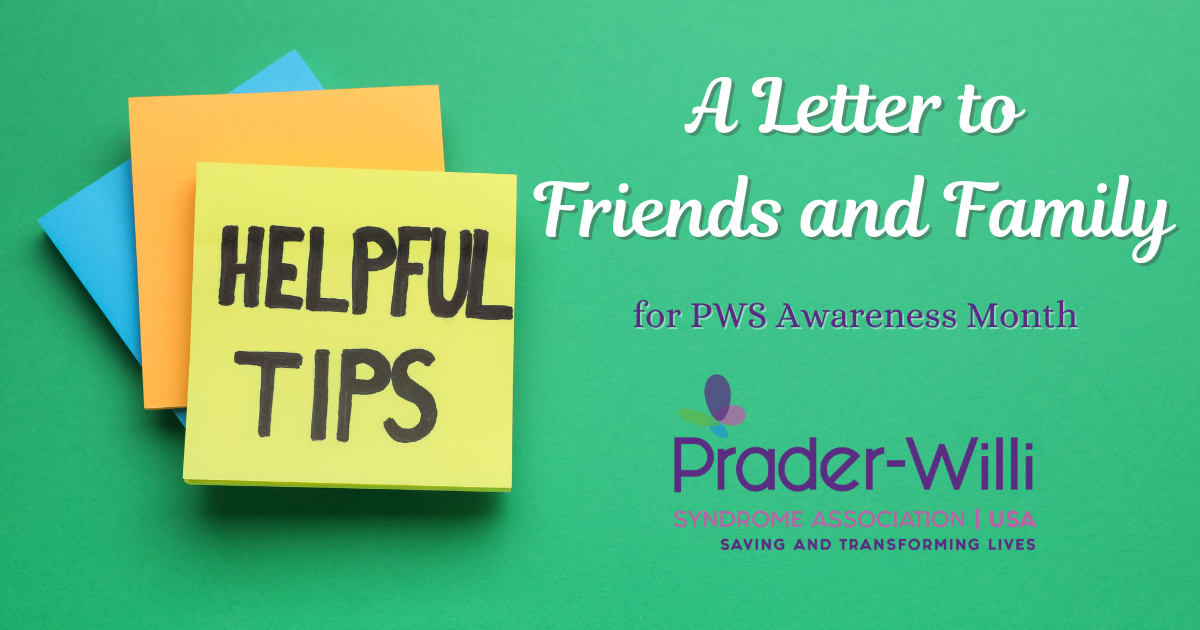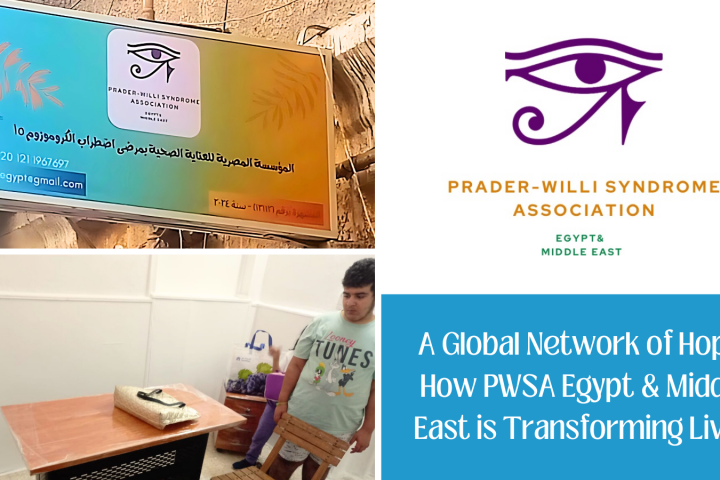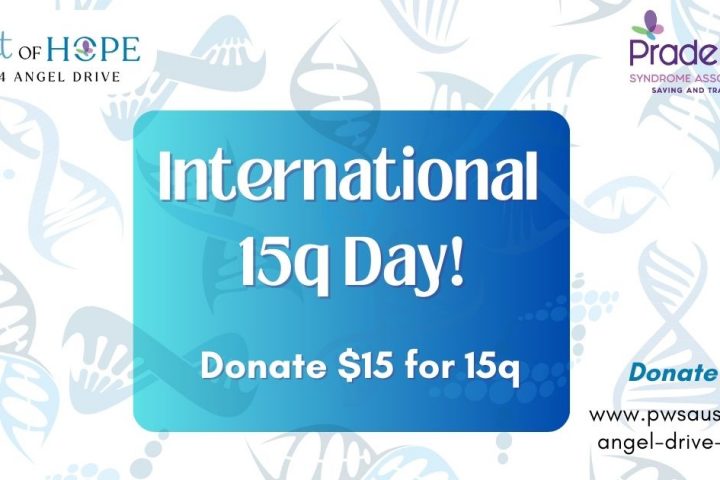Here is a letter to share with your friends and family!
Dear Friends and Family,
Our loved one has a rare genetic disorder called Prader-Willi syndrome (PWS). This diagnosis has brought a lot of unexpected experiences to our family, both joyful and challenging. May is PWS Awareness Month and a great opportunity to help educate our community about our loved one.
Due to the nature of this genetic condition, our family is likely to experience more stress and challenges than typical families. Caregivers of loved ones with PWS are no strangers to feelings of overwhelm and burnout. We ask that you read through these points so you can learn more about how you can help support our loved one and our family.
Help Us Avoid Isolation
- Invite us for activities that don’t involve food. Going to the park, a playground, on hikes or to things like the movies or a performance can be great outings for our family.
- Discuss food expectations before a meal. Gathering over food is one of the most social events in our culture and many families have learned how to navigate these events with the right support. Invite us out for meals or over for BBQs but talk with us first about food safety.
Help Create a PWS-Friendly Environment
Holidays/Birthdays/Special Occasions
- No bowls of candy or snacks stashed around the house. Keep food put away or in one supervised room. Those endless bowls of jellybeans and charcuterie boards can create anxiety and are potentially life threatening to our loved one.
- Cake/Treat Alternative Some families bring cake alternatives to birthday parties and celebrations as diet is an essential part of managing PWS. Our loved ones have a slower metabolism so limiting sugar and refined carbs is necessary to keeping them healthy. Do not be offended if we bring a different treat for our loved one.
- Allow Caregiver to Cut Cake/Serve Food Portion sizes are also a very important part of nutrition or diet management. We know it is often custom for the party host to cut the cake, but please know that we may need to step in and slice an appropriate portion for our loved one.
Meals/Food Etiquette
- Do Not Offer Food/Drink Inform the caregiver of what drinks and foods are available and get permission to offer those choices or allow the caregiver to offer the options. Do not offer food to siblings or other people in front of our loved one if it is not appropriate for them to eat as well.
- Do Not Eat in Front of Our Loved One Outside of Mealtimes Food creates anxiety and potential hazards for our loved one. Please do not eat in front of them if food is not safely available for them as well.
- Discuss Food Options Talk with us about what food will be available and ask if there are foods to avoid or replace. Again, diet is a crucial part of managing PWS and we take great pains to keep our loved ones safe.
- Avoid Serve Yourself Buffets Our loved ones typically should not make their own plates of food. Portion control is important and the hyperphagia (the excessive hunger) they feel makes it difficult to serve themselves appropriate proportions.
- Avoid Family-Style Meals Bowls of food at the table can create a lot of anxiety and potential threats to our loved ones. It is best for plates to be dished up separately and then brought to the table.
- Supervision Of Food Food should always be supervised around someone with PWS. If at a gathering, all the food should be in one room where people are present and aware of the actions of the individual with PWS.
Plan Ahead
- Inform Us and Our Loved One Our loved ones do well with schedules and knowing what to expect. When they don’t, their anxiety may increase, sometimes dramatically. Have conversations with us and with our loved ones about what to expect when you invite us over for a gathering. If we know ahead of time that there will be fireworks or a magic show, our loved one will be more likely to enjoy the event rather than if they are surprised by it.
Educate Yourself
- DO NOT GOOGLE Often, one of the first things we are told as parents and caregivers when we receive a diagnosis, is NOT to google. There are many reasons for this. One is that PWS is a spectrum disorder and our loved ones land all over the spectrum, some with more challenges than others. Also, information on the internet can be outdated or come from an unreliable source. There is a lot to know and manage with PWS, and a growing body of research and treatment options to manage the symptoms. Google runs the risk of finding worst-case-scenario information that does not apply to most families with PWS.
- Ask us what resources we have to share with you. We know the trusted sources for PWS information and are happy to share them with you. Pwsausa.org is a great place to start!
- Ask us about our loved one. Our loved ones are individuals and face the varieties of challenges of PWS and life in general in their own ways.
Become an Educated Advocate
- It takes a village. If you are planning a gathering and inviting others, please take a moment to educate those who are coming to the Food Etiquette/Safety that will hopefully be implemented and why. You may want to speak to us first to learn what we are comfortable with sharing.
Remember the Siblings
- Include them in conversations One name for siblings of individuals with special needs is “glass children” because they are, at times, transparent.
- Ask about their needs The needs of the individual with PWS are so prevalent that sometimes the sibling’s needs get overlooked.
- Spend time with them If appropriate, invite them for an outing away from the individual with PWS. Invite them to lunch or some other food-related activity where they can eat in a stress-free environment. These plans should not be made in front of the individual with PWS.
Let Parents/Caregivers Handle Behavior
- Parents Know Best There are many nuances to diverting or facing a potential meltdown in someone with PWS. When someone without knowledge steps in it can create a disaster. PWS behavior can be challenging and embarrassing for the parent/caregiver and individual themselves. Though you may not agree with their tactics, know that the caregiver is doing the best they can with the knowledge they have gained.
- Help Others Find Distraction Elsewhere If appropriate and necessary, help and encourage others to find distraction away from where the behavior is happening. Sometimes individuals with PWS become so overwhelmed and dysregulated that they can’t manage their emotions. Our loved ones often feel great shame after an outburst. Having an audience for a behavior moment can make things far more challenging for the individual and the caregiver.
- Learn Behavior Management Skills Depending on your connection to the family and loved one with PWS, it may be appropriate and beneficial for you to learn some techniques to help. Speak to the parents and caregivers about this.
Give Caregiver’s a Break
- Many parents and caregivers struggle to find time away from the demands of PWS. For many couples, that time comes at the hands of the other parent, leaving even less opportunity to spend time alone together.
- Educate Yourself About PWS With proper education about basic PWS concerns and a conversation with the caregivers about specific needs of our loved one, you can feel confident about spending time with our loved one.
- Ask Parents for Specifics About Their Loved One People with PWS are individuals as much as anyone else. Talk to us about our child to learn of any specific information you may need to know.
- Spend Time with the Individual People with PWS are often very kind, engaging, fun, joyful people to spend time with!
Remember Our Loved Ones Are So Much More Than PWS!
- People First Far too often our loved ones may be seen as their genetic condition and not as the person they are. PWSA is just one aspect. Take the time to get to know them. Ask them questions and share stories with them. Find out what they like to do. Ask them about their life. Show them that you know they are a person far beyond the confines of PWS.
It Takes A Village
- Thank You! Thank you for taking the time to read through this letter. Your compassion and willingness to learn helps us be an active part of the community. It shows us that you care about us, our presence, and the unique needs our family now carries. With your help, our community can be a safer, more inviting place for our loved one.
Thank you to PWCF (another great PWS resource) for their brochure and webpage dedicated to Family and Friends for insight in creating these tips.
Share this!





 Jennifer Bolander has been serving as a Special Education Specialist for PWSA (USA) since October of 2015. She is a graduate of John Carroll University and lives in Ohio with her husband Brad and daughters Kate (17), and Sophia (13) who was born with PWS.
Jennifer Bolander has been serving as a Special Education Specialist for PWSA (USA) since October of 2015. She is a graduate of John Carroll University and lives in Ohio with her husband Brad and daughters Kate (17), and Sophia (13) who was born with PWS. Perry A. Zirkel has written more than 1,500 publications on various aspects of school law, with an emphasis on legal issues in special education. He writes a regular column for NAESP’s Principal magazine and NASP’s Communiqué newsletter, and he did so previously for Phi Delta Kappan and Teaching Exceptional Children.
Perry A. Zirkel has written more than 1,500 publications on various aspects of school law, with an emphasis on legal issues in special education. He writes a regular column for NAESP’s Principal magazine and NASP’s Communiqué newsletter, and he did so previously for Phi Delta Kappan and Teaching Exceptional Children. Evan has worked with the Prader-Willi Syndrome Association (USA) since 2007 primarily as a Crisis Intervention and Family Support Counselor. Evans works with parents and schools to foster strong collaborative relationships and appropriate educational environments for students with PWS.
Evan has worked with the Prader-Willi Syndrome Association (USA) since 2007 primarily as a Crisis Intervention and Family Support Counselor. Evans works with parents and schools to foster strong collaborative relationships and appropriate educational environments for students with PWS. Dr. Amy McTighe is the PWS Program Manager and Inpatient Teacher at the Center for Prader-Willi Syndrome at the Children’s Institute of Pittsburgh. She graduated from Duquesne University receiving her Bachelor’s and Master’s degree in Education with a focus on elementary education, special education, and language arts.
Dr. Amy McTighe is the PWS Program Manager and Inpatient Teacher at the Center for Prader-Willi Syndrome at the Children’s Institute of Pittsburgh. She graduated from Duquesne University receiving her Bachelor’s and Master’s degree in Education with a focus on elementary education, special education, and language arts. Staci Zimmerman works for Prader-Willi Syndrome Association of Colorado as an Individualized Education Program (IEP) consultant. Staci collaborates with the PWS multi-disciplinary clinic at the Children’s Hospital in Denver supporting families and school districts around the United States with their child’s Individual Educational Plan.
Staci Zimmerman works for Prader-Willi Syndrome Association of Colorado as an Individualized Education Program (IEP) consultant. Staci collaborates with the PWS multi-disciplinary clinic at the Children’s Hospital in Denver supporting families and school districts around the United States with their child’s Individual Educational Plan. Founded in 2001, SDLC is a non-profit legal services organization dedicated to protecting and advancing the legal rights of people with disabilities throughout the South. It partners with the Southern Poverty Law Center, Protection and Advocacy (P&A) programs, Legal Services Corporations (LSC) and disability organizations on major, systemic disability rights issues involving the Individuals with Disabilities Education Act (IDEA), Americans with Disabilities Act (ADA), and the federal Medicaid Act. Recently in November 2014, Jim retired.
Founded in 2001, SDLC is a non-profit legal services organization dedicated to protecting and advancing the legal rights of people with disabilities throughout the South. It partners with the Southern Poverty Law Center, Protection and Advocacy (P&A) programs, Legal Services Corporations (LSC) and disability organizations on major, systemic disability rights issues involving the Individuals with Disabilities Education Act (IDEA), Americans with Disabilities Act (ADA), and the federal Medicaid Act. Recently in November 2014, Jim retired.